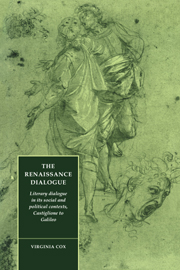 The Renaissance Dialogue
The Renaissance Dialogue Book contents
- Frontmatter
- Contents
- Preface
- 1 Problems of method
- 2 History and invention in the dialogue
- 3 The uses of the dialogue in sixteenth-century Italy: celebration and control
- 4 The uses of the dialogue in sixteenth-century Italy: commerce and courtesy
- 5 Castiglione's Cortegiano: the dialogue as a drama of doubt
- 6 The changing form of the Italian Renaissance dialogue
- 7 The theory and practice of the dialogue in Counter-Reformation Italy
- 8 From the ‘girevole strada’ to the straight and narrow path
- 9 From the open dialogue to the closed book
- Notes
- Bibliography
- Index
9 - From the open dialogue to the closed book
Published online by Cambridge University Press: 05 December 2011
- Frontmatter
- Contents
- Preface
- 1 Problems of method
- 2 History and invention in the dialogue
- 3 The uses of the dialogue in sixteenth-century Italy: celebration and control
- 4 The uses of the dialogue in sixteenth-century Italy: commerce and courtesy
- 5 Castiglione's Cortegiano: the dialogue as a drama of doubt
- 6 The changing form of the Italian Renaissance dialogue
- 7 The theory and practice of the dialogue in Counter-Reformation Italy
- 8 From the ‘girevole strada’ to the straight and narrow path
- 9 From the open dialogue to the closed book
- Notes
- Bibliography
- Index
Summary
… to deliver a System in conversation scarcely appears natural
David Hume, Dialogues concerning Natural Religion (1779)One of the formal developments in the dialogue mentioned in the previous chapter deserves a more thorough examination than it was practicable to give it there. In contrast with the programmatically ‘disordered’ dialogue of Castiglione's era, the dialogue of the late sixteenth century shows an increasing preoccupation with system, method and order. Word like ‘ordine’ and ‘metodo’ recur frequently and anxiously in authors' prefaces and interlocutors' compliments: dim reflections of the mighty controversy which, as Francis Bacon rather discreetly puts it, had been ‘moved’ concerning the ‘method of tradition’ in his time. The present chapter will chart this intrusion of method into the dialogue, and, in doing so, will seek to bring to light the underlying reasons for the genre's decline.
The search for the philosopher's stone of ‘method’ had occupied Renaissance scientists and dialecticians since Agricola and, in the absence of any universally acknowledged directive from the ancients, it had spawned a vast and bewildering series of solutions. In the dialogues I am considering, however, it would be vain to look for reflections of the more sophisticated developments in the field, and one suspects that the methodology of most writers owed as much to imitation of Plato's practice as to reference to his precepts or those of contemporary writers on logic.
- Type
- Chapter
- Information
- The Renaissance DialogueLiterary Dialogue in its Social and Political Contexts, Castiglione to Galileo, pp. 99 - 113Publisher: Cambridge University PressPrint publication year: 1992
